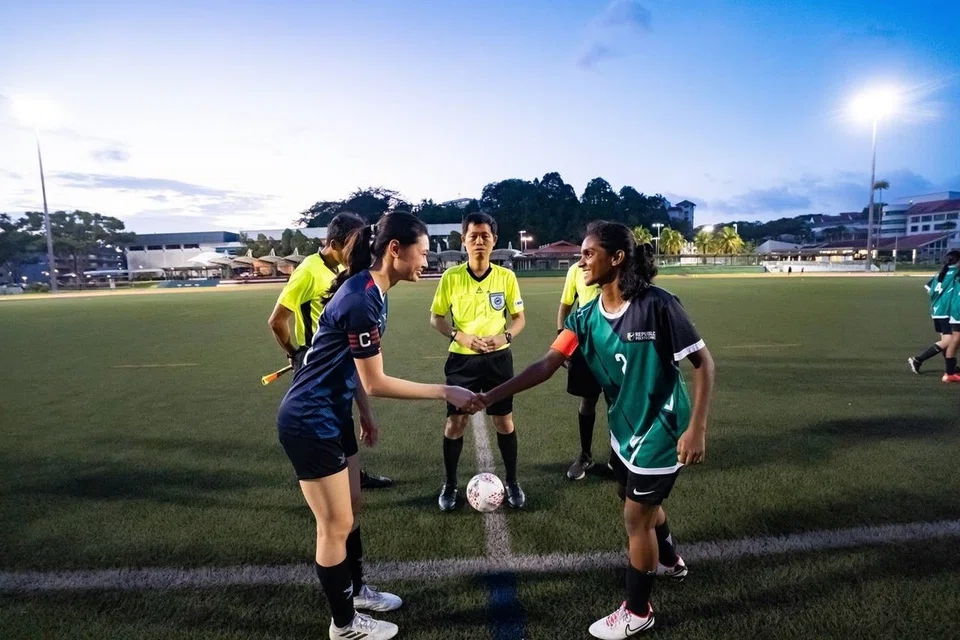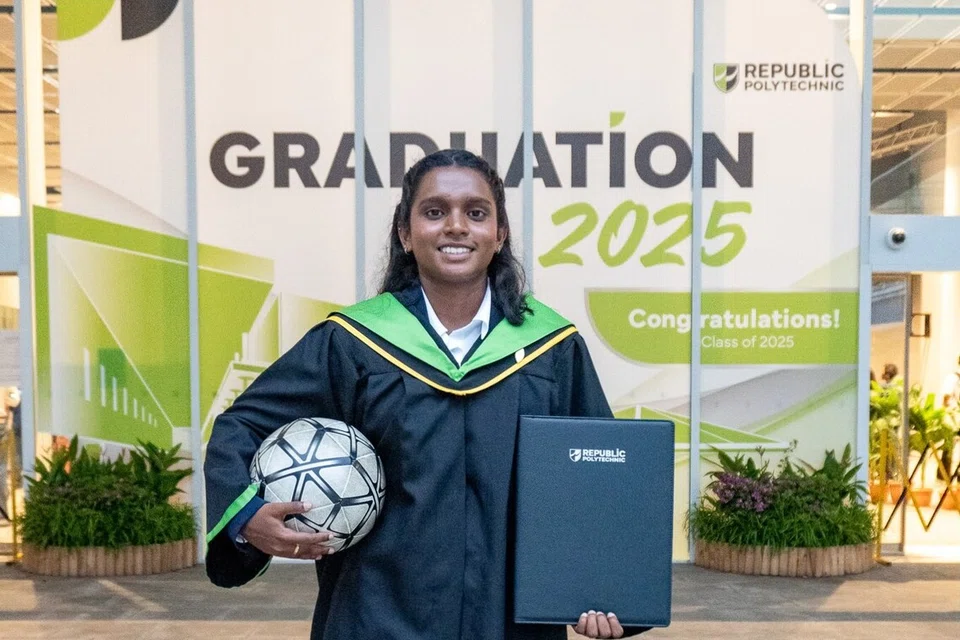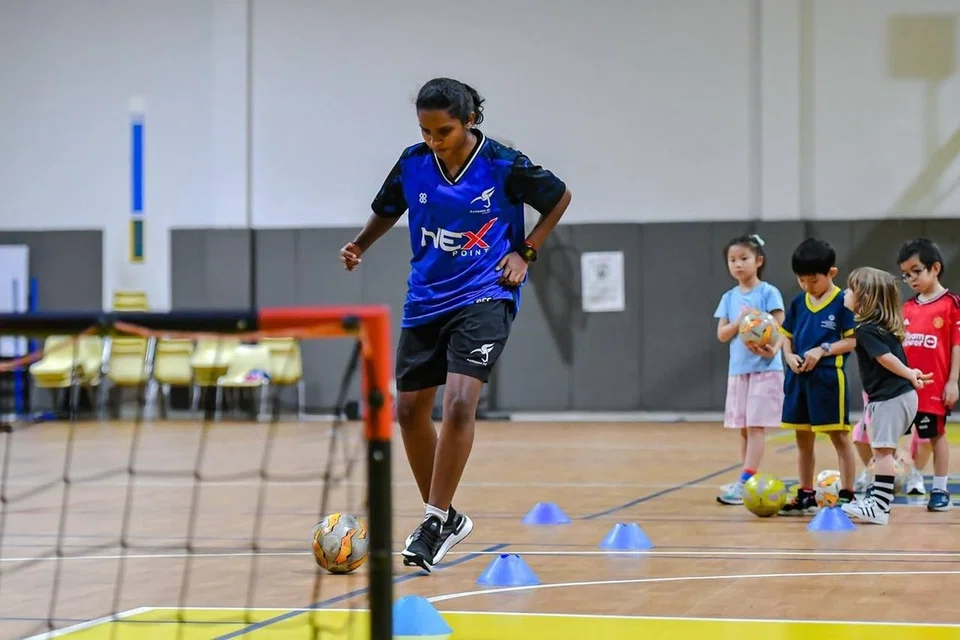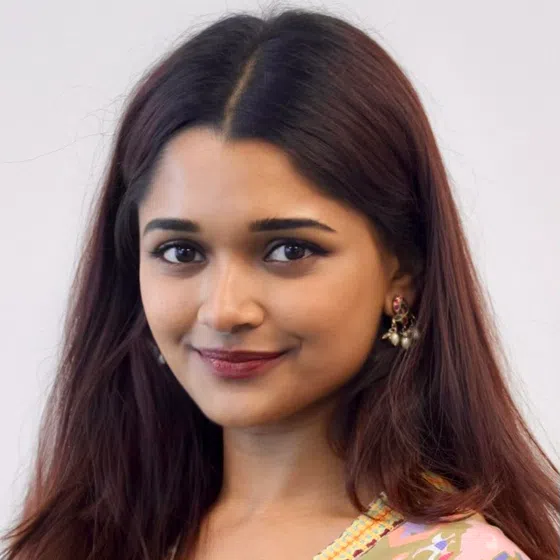In Singapore, the football pitch has long echoed with the cadence of male ambition, a space cordoned off by tradition, reinforced by underinvestment, and preserved by inertia. But 21-year-old K Harini is rewriting that story, cleat by cleat.
“I started when I was 13, in an inter-school C-Division tournament,” she recalls. “At the time, women’s football wasn’t big in Singapore. There was no platform. You just had to figure it out.” That instinct to play, despite the absence of infrastructure, would later carry her to international tournaments in Thailand, Kazakhstan and Myanmar, and eventually into Singapore’s Under-16 national team. Then, just as momentum was gathering, COVID-19 hit. Competitions evaporated and dreams paused. But not for long.
At 17, she became the girls’ football team’s captain at Republic Polytechnic (RP).

“It was a character-building experience,” she says. “Being captain isn’t about shouting instructions. It’s about being adaptable, listening to your team and still delivering under pressure.” Her coach, whom she says is her greatest mentor, taught her how to lead, not by command but by example.
“She trusted me and guided me to utilise my potential.”
Harini took the RP team to victory at the POL-ITE and IVP tournaments – annual sporting competitions in Singapore for polytechnics, ITE, and universities – earning the “Captain of the Year” title in 2024. “Winning under your captaincy feels so good,” she said with a cheeky laugh.

As the second of four siblings, Harini took on part-time work coaching at the French Football Academy Singapore, clocking long weekend hours while juggling studies and matches. Her lecturers were understanding, offering extensions on assignments she could not submit on time. “I needed to keep myself around football,” she says. “Coaching reminded me why I fell in love with football in the first place.”
At RP, she committed to the bigger picture by enrolling in the Diploma in Sports Coaching.
“I wanted to share with the next generation of girls what I didn’t have. It was the next best option after pursuing being a competitive footballer full-time,” Harini said.
A six-month internship at Bangkok Football Club sharpened her skills off the pitch. She learned how to plan sessions, improvise when needed and manage large-scale events, like the Thailand International Youth Cup. “It’s in the same area of enjoying and loving football; it is not playing but rather encouraging people to play.”
Back home, she applied those skills to coaching girls aged 10 to 12 at St. Andrews International School, guiding them through interschool tournaments with a focus not just on winning, but on growing.
Today, she continues to coach even younger toddlers as young as four years old at the French Football Academy. And the transformation she’s witnessed is deeply personal. One of her proudest moments came recently when a four year old girl she coached was promoted to the under-9 girls’ team, outplaying boys older than her.
Harini herself hasn’t stopped playing. She’s now part of Hougang United’s newly formed women’s team, currently halfway through their inaugural season. It’s not glamorous work, and women’s football in Singapore still lacks the backing of its male counterpart. “Even for men, it’s hard – they go overseas to try and make it. But for women, it’s harder because management does not think we are profitable.”
Still, Harini sees hope, not just in herself, but in the growing number of young girls lacing up their boots each week. She’s seeking more school coaching roles, intent on expanding access and visibility. “If I can help one girl stay in the game when she’s told not to bother, that’s already a win.”
Her parents, while supportive, always understood the stakes. “They never stopped me,” she says. “But they knew what I was up against.” She says her biggest inspiration is former American national player Alex Morgan, who continued to play the sport after having a child. “It’s really nice to see that passion and fire that she has to play football.”
That’s why her coaching is more than a side job. By shaping a future she may never fully benefit from, Harini is laying the groundwork for something bigger than herself. “It’s not about me,” she says, almost as an afterthought. “It’s about the girls who come next.



